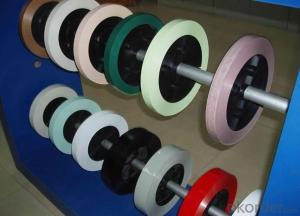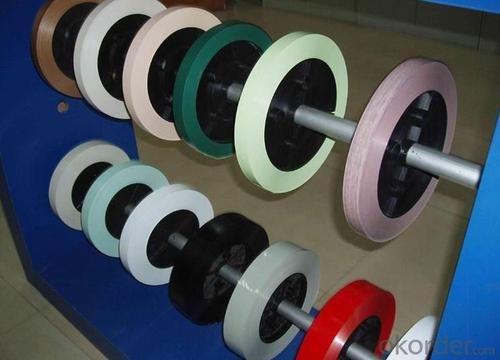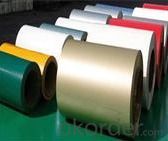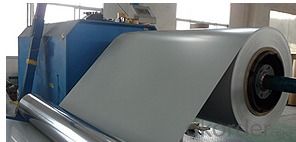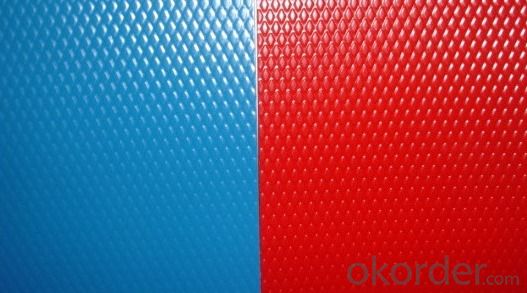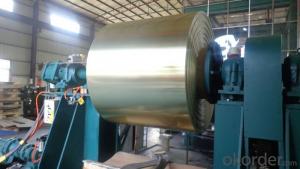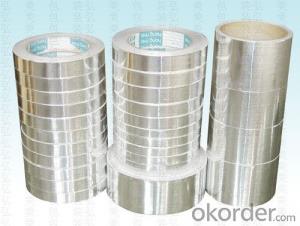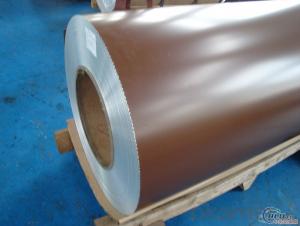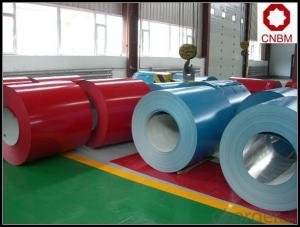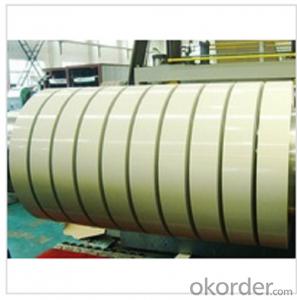3003 H24 PE and PVDF Color Coated Aluminum Coil of Aluminum 6 Wide for Aluminum Composite Panel
- Loading Port:
- Shanghai
- Payment Terms:
- TT OR LC
- Min Order Qty:
- 1 m.t.
- Supply Capability:
- 4000 m.t./month
OKorder Service Pledge
OKorder Financial Service
You Might Also Like
Specification
Product Description:
3003 H24 PE and PVDF color coated aluminum coil for aluminum composite panel
We provide a series of aluminum products,such as aluminum circle,aluminum sheet,aluminum coil,mirror aluminum plate,embossed aluminum plate,aluminum plate,color aluminum plate,etc .
1) PE coated aluminum coil is made via rolling painting and baking, it has various bright colors with small color differences. It is resistant against impact and easy to be machined. All properties meet or surpass the national standard. the product is widely used in indoor and shop front decoration, ceiling roof tile, wall panel, advertisement board, counter, household electric apparatus, and inner and outer decoration of cars and ships.
2) The main raw material of PVDF fluorine carbon coating is PVDF fluorine carbon resin-polyvinylidene fluoride fiber. By maximum electric performance of fluorine atom, a stable and high fluorine bond can be formed. In addition to, the unique equal symmetrical molecular structure, the product are given with outstanding weathering resistance, excellent ultraviolet radiation resistance, and highly endurable corrosion resistance. The outdoor product color and brightness can be maintained for over 20 years. Because of high weather and impact resistance and the high pliability, the product has excellent machining property, and the coated colored panel can be further treated for pattern pressing. This product can be provided in two types: traditional fluorine carbon and nanometer fluorine carbon.
Raw Material
Aluminum Grade:1100,3003,5005.
Temper:H14,H16,H18,H24,etc.
Surface Coating: PE&PVDF
Specification
Thickness:0.024-0.7mm
Coil Width:56-2000mm
Coating Thickness:18-30um.
ID:405/505mm
Coil Weight:0.15-3MT
Gloss:10-90%(EN ISO-2813:1994)
Color: solid, metallic, glossy, real stone, timber design, embossed, etc.
You can choose our color chart, or we adjust the special color as the samples you offer.
Product Feature
1) High gloss
2) High flexibility
3) Excellent impact resistance
4) Excellent weather-proof resistance
5) Anti-ultraviolet
6) High erosion resistance
7) Stable color and gloss
8)Good mechanical processing performance
Coating Characteristic Table
Pre-painted Aluminum Coil | |
Grade and Temper | Alloys: 1050, 1100, 3003,3005,3105, 5005,5052,6061,6063,8011,etc Temper: 0-H112 |
Widths | 35mm -1700 mm available |
Thickness | 0.25mm - 4.0mm |
Coating | PE, PVDF or Customize |
Coil Specifications | I.D.: 405mm, 505mm O.D.: 800mm – 1270mm |
Color | Customized |
Packing Detail | Wooden pallet either eye to wall or eye to sky |
Application | Aluminum Suspended Ceiling ,Aluminum Sandwich Panel, Wall Cladding Panel, Roller Shutter, Metal Roofing, Conner Bead, etc |
Coating Type
| Test Item | Coating | |||||||
| PVDF | PE | |||||||
| Double layers | Three layers | |||||||
| Coating Thickness | ≥24 | ≥30 | ≥18 | |||||
| Glossy Tolerance | While 60°gloosy value ≥80 unit,tolerance±10 unit | |||||||
| While 60°gloosy value ≥20-80 unit,tolerance±7 unit | ||||||||
| While 60°gloosy value<20 unit,tolerance±5 unit | ||||||||
| Pencil Hardness | ≥1H | ≥2H | ||||||
| Flexibility of coating | While ≤2T,coating no crack or peer off | |||||||
| Adhesive property | 0 or 1 grade | |||||||
| Impact resistance | coating no crack no peer off | |||||||
| Acid resistance | Surface immersed with 5% HCL(V/V) for 48H | Surface immersed with 2% HCL(V/V) | ||||||
| without change | for 24H without change | |||||||
| Solvent Resistance | Brushing 200 times with butanone no appearance | Brushing 100 times with butanone no | ||||||
| to bottom | appearance to bottom | |||||||
| Chromatism | The coating color is almost the same as confirmed by buyer and seller,the color difference tested by | |||||||
| colorimeter between single coating and sample is less than 1.2(ΔE≤1.2),same lot products color difference | ||||||||
| ΔE≤1.0 | ||||||||
| Salt Fog Resistance | Outside 2mm the line which is scratched,no corrosion | |||||||
| and coating peel off | ||||||||
| Moisture Resistance | Coating change is less than 1 grade after 1000 hours | |||||||
| humidity test | ||||||||
| Weather Resistance | After 2000 hours xenon lamp shining test(artificially | |||||||
| accelerating ageing test),no powder come into being, | ||||||||
| glossy retention rate(after and before test percent rate) | ||||||||
| ≥85%,color change degree at least reaching to 1 grade | ||||||||
| Note:The test is as per China National Standard and Nonferrous Metals Industry Standard for color coated aluminum | ||||||||
| coil and ACP | ||||||||
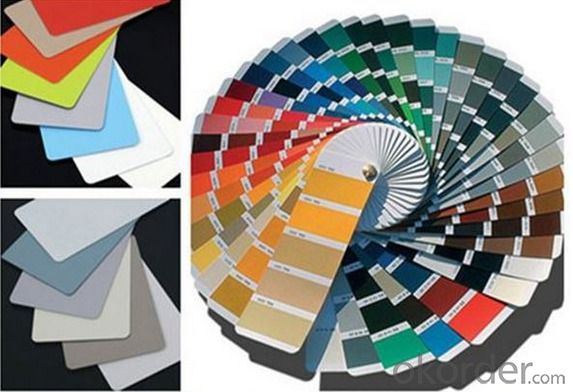
FAQ of Coated Aluminum Coil for Aluminum Composite Panel
1.Superior quality of raw material.
2.Reasonable and stable chemical composition.
3.Accurate tolerance.
4.Goode mechanical property.
5.We have the certificate of ISO9001.
- Q: Describe the various types of coatings applied to steel coils and their applications.
- <p>Steel coils can be coated with several different types of materials to enhance their properties for various applications. Common coatings include: 1) Galvanized coating, which provides corrosion resistance and is used in construction and automotive industries. 2) Pre-painted or color-coated steel, which is coated with organic paint and used for aesthetic purposes in buildings and appliances. 3) Aluminized coating, offering high-temperature resistance and used in heat-treating processes. 4) Zinc-iron alloy coating, which combines the benefits of zinc and iron for enhanced corrosion protection. 5) Organic coatings such as epoxy or polyurethane, used for specific chemical resistance or additional protection in harsh environments. Each type of coating is chosen based on the specific requirements of the end product and the environmental conditions it will face.</p>
- Q: Can aluminum coils be used for roofing applications?
- Yes, aluminum coils can be used for roofing applications. Aluminum is a popular choice for roofing materials due to its numerous advantages. It is lightweight, which makes it easier to transport and install. Aluminum is also highly durable and resistant to corrosion, which ensures a longer lifespan for the roof. Additionally, aluminum is a great choice for areas with high humidity or coastal regions, as it does not rust. Moreover, aluminum roofing is energy efficient, as it reflects sunlight and heat, reducing cooling costs. Overall, aluminum coils are an excellent option for roofing applications due to their strength, durability, and energy efficiency.
- Q: What is the hardness of aluminum coils?
- The hardness of aluminum coils is subject to change due to several factors, including the particular alloy employed and the applied tempering process. Typically, in comparison to other metals, aluminum coils exhibit relatively low hardness. Aluminum is esteemed for its lightweight and pliable characteristics, rendering it effortlessly bendable and moldable. Nevertheless, by subjecting aluminum coils to diverse heat treatment methods like annealing or cold working, their hardness can be augmented to fulfill specific criteria. It should be emphasized that the hardness of aluminum coils can also fluctuate depending on the intended purpose and the desired degree of robustness and endurance.
- Q: What are the disadvantages of using aluminum coils?
- Using aluminum coils in various applications has several drawbacks. To begin with, compared to materials like copper, aluminum coils have a lower heat transfer coefficient. This means they are not as effective in transferring heat, which can negatively impact the performance and energy efficiency of cooling or heating systems. Moreover, aluminum coils are more susceptible to corrosion compared to copper coils. This is particularly true in environments with high humidity or exposure to harsh chemicals. Corrosion can result in leaks in the coil, reducing its lifespan and potentially causing damage to the system. Another disadvantage of aluminum coils is their relatively lower tensile strength compared to other materials. This makes them more vulnerable to damage or failure under excessive pressure or stress. This can be a concern in applications where the coils are subject to high pressure or frequent movement. Additionally, aluminum coils can be more costly compared to materials like copper. Although aluminum itself is cheaper, the manufacturing processes involved in producing aluminum coils and the additional coatings required to enhance its performance can increase the overall cost. Lastly, aluminum coils may require more maintenance and cleaning compared to other materials. Due to their tendency to accumulate dust, dirt, and debris more easily, regular cleaning is necessary to maintain their performance and prevent clogging or blockages. Overall, while aluminum coils have advantages such as being lightweight and resistant to corrosion in certain environments, it is important to consider these disadvantages when selecting the appropriate coil material for specific applications.
- Q: What are the strength properties of aluminum coils?
- The strength properties of aluminum coils include high tensile strength, excellent formability, and good resistance to corrosion. Aluminum coils have a high strength-to-weight ratio, making them a preferred choice in various industries such as automotive, aerospace, and construction. They exhibit good resistance to fatigue and are capable of withstanding heavy loads without deformation or breakage. Additionally, aluminum coils offer excellent formability, allowing for easy shaping and bending without compromising their structural integrity. Moreover, aluminum's natural oxide layer provides a protective barrier against corrosion, making aluminum coils highly resistant to rust and other forms of degradation. Overall, the strength properties of aluminum coils make them a versatile and reliable material for a wide range of applications.
- Q: Is it possible to utilize aluminum coils in the automotive industry?
- <p>Yes, aluminum coils are widely used in the automotive industry. They are employed in various applications such as engine parts, heat exchangers, and body panels due to their lightweight, corrosion resistance, and high strength-to-weight ratio. Aluminum's recyclability and energy efficiency in production also contribute to its popularity in vehicle manufacturing.</p>
- Q: What is the typical coil diameter for aluminum coils?
- The diameter of aluminum coils can differ based on the particular application and industry needs. Generally, aluminum coils possess a diameter spanning from 12 to 72 inches. The precise diameter is determined by several factors including the thickness of the aluminum sheet, desired coil weight, and the processing and handling equipment employed. Various industries like automotive, construction, and packaging might have specific coil diameter requirements tailored to their distinctive manufacturing processes and end-use demands.
- Q: Can aluminum coils be used for solar panel installations?
- Yes, aluminum coils can be used for solar panel installations. Aluminum is a commonly used material in the solar industry due to its lightweight, durability, and corrosion resistance. Aluminum coils can be used as framing materials for mounting solar panels, providing a sturdy and long-lasting support structure. They also offer excellent heat dissipation properties, which is important for efficient solar panel performance. Additionally, aluminum coils are easy to work with, making the installation process more convenient. Overall, using aluminum coils for solar panel installations is a popular and effective choice.
- Q: This question asks for precautions that should be taken when handling aluminum coils to ensure safety.
- <p>When handling aluminum coil, it's crucial to follow safety measures to prevent accidents and injuries. Always wear appropriate personal protective equipment (PPE), including gloves, safety glasses, and closed-toe shoes. Ensure that the work area is well-lit and free from clutter to avoid trips and falls. Use lifting equipment, such as cranes or forklifts, for heavy coils and never attempt to lift them manually. Keep the coils dry to prevent corrosion and ensure they are stored properly on wooden pallets or racks to prevent damage. Be aware of the risk of aluminum dust, which can be a fire hazard, and ensure proper ventilation is in place. Regularly inspect the coil for any sharp edges or damage that could cause injury. Always follow the manufacturer's guidelines and adhere to local safety regulations.</p>
- Q: What are the different finishes available for aluminum coils?
- There are several different finishes available for aluminum coils, each offering unique properties and aesthetics. 1. Mill Finish: This is the most basic and common finish for aluminum coils. It is the natural appearance of aluminum without any additional treatment or coating. Mill finish provides a smooth and shiny surface, but it is not as resistant to corrosion as other finishes. 2. Anodized Finish: Anodizing is an electrochemical process that enhances the corrosion resistance and durability of aluminum. This finish creates a thick, protective layer on the surface of the aluminum coil, making it highly resistant to weathering, scratches, and fading. Anodized finishes are available in a range of colors and can also be customized to match specific design requirements. 3. Painted Finish: Aluminum coils can be painted with various types of coatings to achieve specific colors, textures, and levels of durability. These coatings are typically applied using a coil coating process, where the paint is evenly distributed and cured onto the surface of the aluminum. Painted finishes offer excellent color retention, weather resistance, and can be tailored to meet specific project needs. 4. Brushed Finish: This finish is achieved by mechanically brushing the surface of the aluminum coil with abrasive materials, resulting in a textured appearance. Brushed finishes provide a unique aesthetic appeal and can hide scratches and blemishes. They are commonly used in architectural applications such as interior design, signage, and furniture. 5. Embossed Finish: Embossing involves imprinting a pattern or design onto the surface of the aluminum coil. This finish adds texture and visual interest to the material, making it suitable for decorative purposes. Embossed finishes can mimic various textures, such as wood grain or stucco, and are widely used in building facades, roofing, and signage. 6. Laminated Finish: Laminating involves bonding a layer of protective film or sheet onto the surface of the aluminum coil. This finish provides additional protection against scratches, stains, and UV rays. Laminated finishes are commonly used in applications that require high durability, such as transportation, appliances, and electronic enclosures. Overall, the choice of finish for aluminum coils depends on the specific requirements of the project, including aesthetics, durability, and environmental factors.
Send your message to us
3003 H24 PE and PVDF Color Coated Aluminum Coil of Aluminum 6 Wide for Aluminum Composite Panel
- Loading Port:
- Shanghai
- Payment Terms:
- TT OR LC
- Min Order Qty:
- 1 m.t.
- Supply Capability:
- 4000 m.t./month
OKorder Service Pledge
OKorder Financial Service
Similar products
Hot products
Hot Searches
Related keywords
